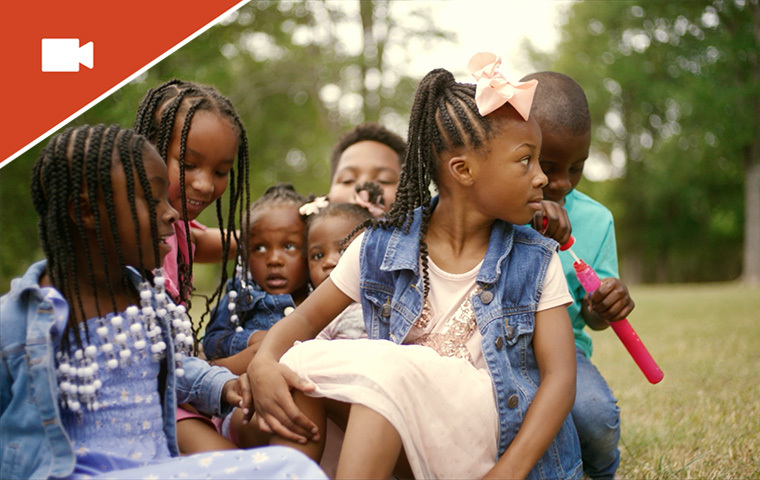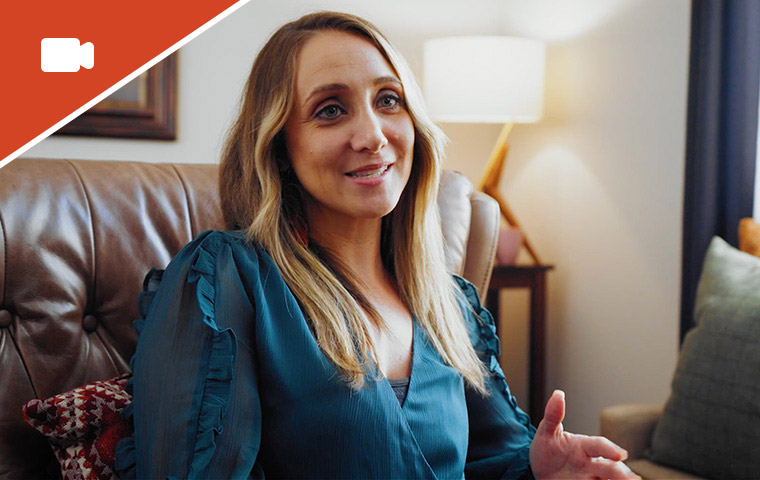When María found herself unexpectedly raising her grandson Nova, she faced many challenges. Because María isn’t Nova’s birth parent, she had trouble getting the paperwork they needed for things like school enrollment and making doctors’ appointments for his speech therapy.
“I never thought I would end up here,” María says. “I did not think I would raise my own grandson. It was a traumatic situation for me because I wasn't finding the answers, and the pandemic was happening, and no one was doing therapy. We had no options at that time. I did not know what was going to happen until someone recommended the Kinship Program. Then I started to feel like there was help.”
Support for Caregivers
The Kinship Program is a free program designed to support grandparents, aunts, uncles, and other family members who are raising children who can’t live with their birth parents. For generations, extended families have played an important role in raising children whose parents are having a hard time. Known as kinship care, this is a valuable way to offer kids the stability they need to grow into healthy, successful adults. Through the Kinship Program, caregivers and children can find help with resources, advice, and the support of a caring community who shares many of their same struggles.
Help from the Start
After facing obstacles while helping to raise her five nieces and nephews, Teresa (Terri) Rodriguez started the Kinship Program in 2020 to help other families. Today, Terri is the director of the Kinship Program in Lubbock, and María and her family remain close to her heart. “María came to us,” Terri says. “We laughed, we cried, and later she told me what she needed. And that she didn't know where to start. And that's when I told her, don't worry, I am going to help you.”
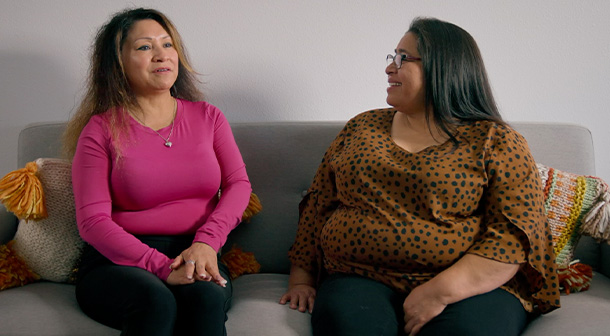
María and Terri talk about the Kinship Program.
Counseling, Services, and More
Through the Kinship Program, Nova was able to get access to counseling and the speech therapy services he needed. Even though he was typically shy around new adults, he felt a particular bond with Terri. “Terri encouraged Nova to start looking at life differently. And he did not want to see anyone else, so he did not put up a fight to go,” María says. “For example, in school he was not learning. So, he stayed with her, and she gave him therapy for six months. And that is where he started to talk and to stay for more time without me. So, from there we started to be able to look for more help for him.”
Solutions Ahead
When Nova started to talk, María began to feel like their world was opening up. “We started to see that there were solutions and that the Kinship Program was what was helping us with everything we thought was impossible to overcome,” María says. “I enrolled him in school, and in school he started to pick up on speech. He was doing multiple therapies. He was not scared anymore; he began to deal with his fears and to overcome his traumas.”
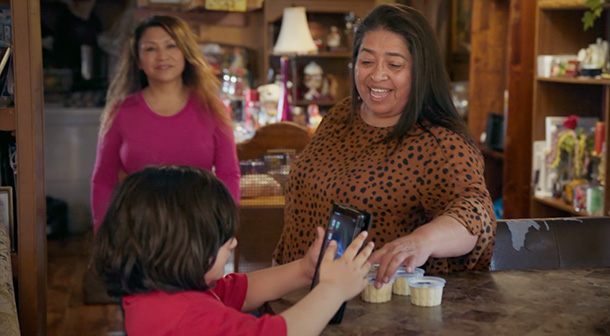
Terri loves spending time with Nova.
Meeting Families Where They Are
The Kinship Program offers a wide range of services that vary by provider group across the state. “We do a little bit of everything,” Terri says. “Kinship can provide help with rent or electric and water bills for caretakers with kids. Sometimes kids arrive at their new home without clothes. We help them with clothes and food. Sometimes they need medications, too. Or let us say a child comes as a baby, because there are also newborns, and the caretakers need help getting a car seat to transport them, we can help with that.”
Access to Many Resources
One of the key things Kinship does is connect caregivers and children with other programs that are available in their specific communities. “We help the family with whatever they need,” Terri says. “We have another program that can help kids manage trauma they might have when they get to the family member’s house that’s taking care of them. There’s a program that can assist with medications. Or if the biological parents are trying to regain custody of their kids, we have a program to empower parents and help them get ahead. If people want to go back to school to earn their high school diploma, we can help them.”
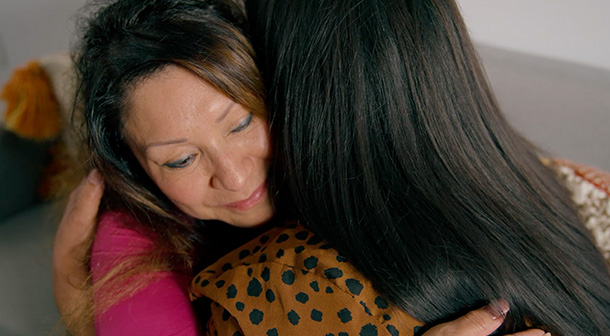
Terri and María have formed a special friendship over the years.
Families Helping Families
Many families feel that one of the most valuable parts of the Kinship Program is the relationships that form between families during weekly support groups. By helping each other get through challenges, both caregivers and children build confidence and realize they are not alone. “We would get in small groups on the weekends so the kids can get to know each other,” María says. “The families we sit down with, there is a bond—we get to know each other and help with each other's problems. They support us, and we support them. I had not found the right people, but now I have found them.”
“Kinship wants to give people hope—not just caretakers, but children,” Terri says. “To be able to get ahead and feel supported not only by their own families, but by other families. It builds those relationships that we can trust one another enough to talk and be sincere.”
Kinship Program Offers Love and Support
At the Kinship Program, caregivers such as relatives and other individuals who have a relationship with the child can receive services if at least one of the children in their care is under the age of 18 at the time of enrollment. “Kinship is different because they do not say, ‘Do you have papers or not?’” María says. “Kinship does not ask anything. Your race does not matter, your nationality, none of that. Kinship offers love and support for everyone—it does not matter where they come from.”
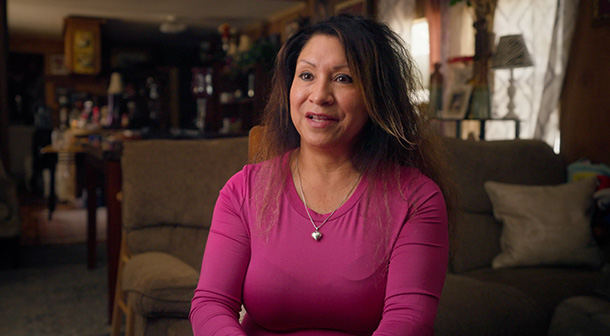
María shares how the Kinship Program has changed her life for the better.
Sailing on the Ship to Success
María credits the Kinship Program with changing her life—and Nova’s—for the better. “I feel so good in this program because I got out from where I was and now my life continues to improve. Terri sends us a message every morning to see how we're doing and what we need. There is hope, it's out there; all you have to do is come to the Kinship Program and you'll find it. Today with Kinship, I am very happy, and my grandson is very happy, and he is someone who already has a bright future.”
Finding Programs Near You
The Kinship Program is currently available in Brown, Crosby, Fort Bend, Hale, Harris, Hill, Hockley, Johnson, Jones, Lubbock, Lynn, Palo Pinto, Parker, Tarrant, Taylor, Waller. To qualify for this child and family service, families must live in the specified service delivery area county or combined service area. Because the program is offered through local community partners, availability, eligibility, and resources vary by county. Find programs in your area.


